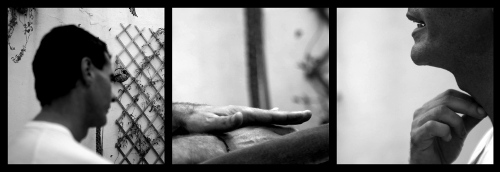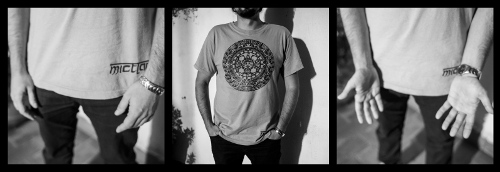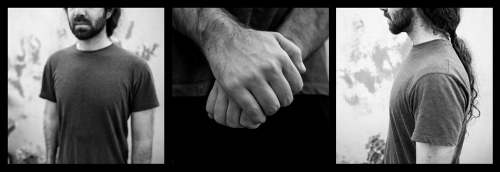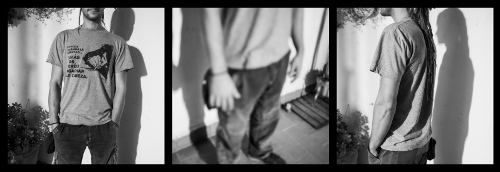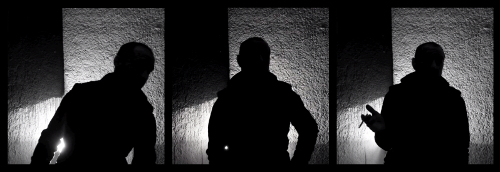VOIZES speak up against global prison industries
- January 31, 2015
Authority & Abolition
First-person insights into incarceration and freedom, by ex-prisoners themselves, from Barcelona’s Fractures Photo Collective and its project, VOIZES.
- Author
Today in the world, there are more people incarcerated than ever before in human history. VOIZES is an international census of this prison experience. Through a collaborative archive of interviews with prisoners and ex-prisoners, VOIZES documents what prisoners have to say about the international prison industrial complex.
— VOIZES Archive
An interview with William Sands, photojournalist with the Fractures Photo Collective and VOIZES.
Luigi Celentano: A little introduction for those who do not know you at all: What is the Fractures Photo Collective and what do you do exactly?
William Sands: Fractures Photo Collective was created in the spring of 2011 here in Barcelona, and we primarily focus on long-format photojournalism and documentary work. However, the VOIZES Archive is not exclusively a Fractures’ project. In reality, only two members of Fractures are active participants in VOIZES. The rest of the VOIZES team is made up of activists, artists, and other journalists from the Groundpress collective.
What has been your main impulse in taking up this challenge of creating VOIZES? And how was the project born?
Some of us have been long time participants in a grassroots abolitionist initiative called La Biblioteca de la Evasión or the Library of Escape. La Biblioteca de la Evasión is a prisoner book-sharing program we’ve been doing for more than five years. Two weekends a month, we visit a prison near Barcelona called Quatre Camins and give books to family members entering to visit their loved ones, and they pass the books along during the visit. Using the books as a meeting point, La Biblioteca seeks to engage prisoners where they are, in a conversation about prison abolition. Inside all of the books there is a stamp that explains the project and how they can request specific literature and an address where they can write to if they have other requests or concerns. We state very clearly that we are abolitionists and seek alternative forms of conflict resolution.
After years visiting Quatre Camins, La Biblioteca organized our first public event: Voces Desde Dentro, an exhibition of artwork by prisoners and ex-prisoners from all over the world. The exhibition was hosted in an occupied social center here in Barcelona and lasted for three days. There was poetry, photography, drawings and sketches as well as a series of presentations. The exhibit finished with a round-table discussion of prison abolition, privileging the voices of ex-prisoners, current prisoners’ family members, and social workers working in prisons.
The VOIZES Archive is a natural continuation of this process. Given that today we live in a globalized world, we believe that any real lasting conversation about prison abolition has to be international in nature and has to be guided by prisoners and the communities they come from. As a result the idea of creating a global census of the prisoner experience was born, and the VOIZES Archive was created.
Looking around the internet we couldn’t find a single site that was dedicated to collecting these stories and experiences, and even less so on an international level. So it seemed the project was relevant and worth embarking on.
Are they collaborative interviews, in the sense that anyone in civil society can contribute to the project?
Yes! Anyone can participate! Our goal is to include interviews from as many countries as possible, and the only way to do so is through collaboration. We’ve launched the website with the interviews we’ve done here in Barcelona and we plan to continue to do more interviews. But in order to expand the breadth of the project we’ve reached out to specific activists, photographers and videographers, asking them to contribute. And on the website there is a how-to manual explaining the basics of a VOIZES-interview, as well as a list of other ways to collaborate with the project. So it is our hope that eventually the project will boast of broad international participation.
In order to make the archive as powerful as possible, there are some aesthetic and theoretical guidelines to all of our interviews. They are all anonymous. All interviews use the VOIZES questionnaire. And, finally we reserve the right to approve all final edits and post-production.
What has been the process of selection of inmates for these interviews? Did you have certain parameters to follow as to which kind of prisoners to approach, or was it more of a voluntary process on their part? [I talk about inmates and prisoners, but I’ve realized most of them are in the process of getting out, or have been released already]
Anyone who has been incarcerated for more than a month can be interviewed. And we define incarcerated fairly broadly: immigration detention, prison, jail, juvenile detention, court ordered psychiatric treatment in a closed facility, etc. We’ve decided on the one month minimum in order to establish a basic common denominator given that the experience can vary so much between institution, state, country, etc.
Unfortunately most of the interviews we’ve done have come from our own communities. They are friends and family. I say, unfortunately, because we all would prefer not to be so intimately affected by the prison industrial complex.
How do you think these interviews help the prisoners themselves? Is it merely cathartic for them? What has been their reaction to the interviews and to the project?
I can’t really presume how this project has helped any of its participants. I’d hope that it is in some way cathartic, however I think the experience for the interviewees varies greatly. This being said, of all the people we have interviewed ourselves, regardless of how they felt about participating before the interview started, none have responded negatively. All edited interviews must be first approved by the interviewee before they go online, and everyone has been happy with the final cuts.
While I’m not specialized in mental health, I want to believe this project has some therapeutic value. It is designed to be a safe space to anonymously share an experience that unfortunately too many people in this world have lived. Sharing is an important first step to healing any sort of trauma, and it probably goes without saying, but I consider incarceration a trauma.
Have you encountered any kind of opposition or censorship from penal authorities when coming up with this project?
So far, no. I say so far because we’ve been doing all of our interviews outside of incarceration facilities. We are currently working on getting access to interview inside some prisons, but it is a slow and very bureaucratic process. Hopefully, in the future we’ll have more opposition and censorship, because that would probably mean the project is effective.
So far we have seen interviews about Spain and Puerto Rico prisons. Which has been the most difficult to shoot? Is there any subject the inmates refused to talk about, despite the questionnaire? And, in which other countries have you made interviews or received interviews from?
All of the current interviews have been shot here in Barcelona or in the surrounding area, including the interview with the woman that was detained in Puerto Rico. Generally, the questions in the questionnaire are designed to be broad, so as to highlight parallels and accentuate the differences between individual interviews. By far, the most difficult question for the interviewees to answer is the question about alternatives.
We are currently working on coordinating interviews in Argentina, Israel, Palestine, Ukraine, Venezuela, and France. And in March we are planning on taking the project to the United States where we’ll be organizing a series of workshops and presentations, as well as continuing the collection of interviews.
The majority of prisoners interviewed were incarcerated for the first time and they tell about the trauma of such an experience, of being imprisoned, of regaining liberty and its aftermath. Have you interviewed recidivist prisoners? Do you think they deal differently (or better, if we can say that) with the prison system?
So far we have only done one interview with someone that has a long history of recidivism. While I can’t point to any specific differences, other than the broader focus of the interview, generally speaking the shorter the interviewee’s sentence is/was, the more they talk about their detention and entry into prison. Whereas in those interviews we’ve done with people that have served longer sentences or have been incarcerated repeatedly, the interviewee has focused more on the experience and institution of incarceration.
Many of the prisoners, when asked about who’s inside, they all agree on the same thing: the majority of the people incarcerated are individuals without resources, the poor, people who can’t afford a good lawyer, immigrants, minorities. The mere thought of it is depressing enough, but isn’t this a reflection of our society, of its inability or unwillingness to address its flaws accordingly? Isn’t prison a mirror wherein society can actually punish these people even more and in more appalling ways, for being what they are or what circumstances made them to be?
I think this is true. But I’d add that it’s also about maintaining very specific power structures and economic structures that guide the globalized capitalist world. Prison is about control and subjugation. It is about guaranteeing the economic and political interests of those in power, those controlling the criminal justice system and the broader economy. More than punishment, I’d say prison is about maintaining white power. It is the ultimate tool of marginalization. As a result, as long as we don’t address the broader legacies of slavery, colonialism, and imperialism and understand the prison industrial complex within this framework, it will be hard to affect any lasting change.
Dostoyevsky once said that a society is best judged by the way it treats its prisoners, and there is a saying that asserts that every prisoner is political. It already says a lot about Western civilization and the society we live in. Do you think that a change in the way we deal with the established concepts of crime and delinquency and, consequently, with sentencing, imprisonment and prisoners’ reinsertion into society, ought to be a progressive and gradual one, both from the inside as well as the outside, from the prisons themselves and from society and its political structures; or should it be a radical one?
In general I think history moves slowly, and as a result so will any abolition debate or movement towards meaningful reform in the dominant logics of criminal justice. Prison abolition or any radical change of the criminal justice system will not occur in a vacuum, it must be part of a broader social transformation. As a result it is part of an extended struggle, probably longer than our lifetime. Undoubtedly, there will be moments of radical change, but I think we should all be planning on playing the long game.
Finally, considering all the accounts of detention and subjugation stemming from the prisoners’ interviews, do you see any hope in the fight against the prison industrial complex in terms of better conditions, better treatment of inmates and detainees, or do you see this business becoming more profitable for speculators and at the same time more abusive and tyrannical in its scope, in spite of all the resistance movements against it?
I have to be hopeful; otherwise there is no sense in doing this work. As a documentary photographer and photojournalist I’ve covered many topics and followed many people documenting their stories of loss, struggle, resistance, consumption, and marginalization. And I’m continuously inspired by the human spirit. Our strength, creativity, and courage are really powerful. As result, I believe strongly in our capacity to affect change. Specifically, in regards to the prison industrial complex, I believe we’ve reached a critical historical moment where the opportunity for radical change is growing.
In the United States, where the prison industrial complex was born, the economic crisis has ushered in a new opportunity for debate. For many states the economic costs of mass-incarceration have become just too much of a burden. This, coupled with shifts in the country’s feeling about current drug policy, means there is more space for debate than ever before. I think we have to take advantage of this moment. Internationally, I believe that for the same reasons there is a growing awareness that incarceration does not work, be it subconsciously or not. So we just have to keep plugging along.
Thank you so much for taking the time to answer these questions. We hope to see more interviews at VOIZES in the future and we wish you all the best for the project.
Thank you for this opportunity to talk about VOIZES. We really appreciate it, and we strongly encourage your readers to take a closer look at the website and if possible, collaborate!!! Thanks again.
Source URL — https://roarmag.org/essays/voizes-prison-abolition-project/


